- Home
- Robert Hellenga
The Truth About Death
The Truth About Death Read online
To Simone,
and in memoriam,
Heathcliff,
Saskia,
Maya,
Mishka
BY THE SAME AUTHOR
The Confessions of Frances Godwin
Snakewoman of Little Egypt
The Italian Lover
Philosophy Made Simple
Blues Lessons
The Fall of a Sparrow
The Sixteen Pleasures
CONTENTS
The Truth About Death
A Christmas Letter
For Sale
The Second Coming
Snapshots of Aphrodite
I Speak a Little French
How to Write a Memoir
The Mountain of Lights
Pockets of Silence
THE TRUTH ABOUT DEATH
CHAPTER I: THE REMOVAL
PART I: SIMON
In the prep room Simon Oldfield studied his daughter, Hildegard—Hildi—as she slipped on a pair of disposable gloves and adjusted the strings of a shiny, disposable gray apron. He could see her mother in her stance—back straight, hip cocked, weight on one foot; he could see her mother in her long legs and long red hair—a splash of color in the pearly gray windowless room—and in her easy smile and her careless physical confidence; and he could see himself in her small-town, open, Midwestern face, though she’d just moved back from four years on the West Coast.
“You need to tie your hair back,” he said, “before we get started.”
“You got any of those curiously strong mints you used to give me?”
He laughed and shook his head.
The man stretched out on the steel embalming table, head propped up on a head block, as if he were peeking at his toes, was Simon’s father—Bartemaeus Oldfield. He was naked, but his genitals were covered with a towel. Simon had already inserted the eye caps and set the features.
“You can shake his hand,” he said. “He won’t mind. Not anymore. I’ve already given him a bath.”
“You’re sure he’s dead?”
“He’d better be.” Simon put his hand on his father’s chest.
“I guess sometimes you’ve got to joke around,” she said.
“You’re sure you’re up for this?”
“Pop.” She gave the word two syllables—“Pah-ahp”—and adjusted her granny glasses. Simon didn’t know if they were fashionable or just old-fashioned. They made her look serious.
“You’re glad he’s dead, aren’t you?” she said.
“Well, relieved.”
Simon sutured the mouth shut, and then inserted a cannula into his father’s carotid artery and a drainage hose into the jugular vein. He hooked up the embalming machine, and while the machine pumped a diluted mixture of formalde-hyde and glutaraldehyde into the artery, forcing the blood out through the drainage hose, he massaged his father’s right hand. “You take the left hand,” he shouted over the loud hum of the machine, “and just work your way up. You want to loosen up the rigor and massage the blood out and work the embalming fluid in.” Hildi didn’t hesitate. She took her grandfather’s hand in her own and began to massage it.
“You’re right,” he said in a loud voice. “I am glad. He made life miserable for your grandmother at the end. He made life miserable for everyone. He and that fake priest. All those e-mails.”
“I got them too,” she said. “Josh thought they were hysterical.”
Josh was Hildi’s soon-to-be ex-husband.
The fake priest, Father Axline, had persuaded Bart, and quite a few others, that the End Times were near. The signs were unmistakable: 9/11, the massing of a great army in the Far East, the wars in the Middle East, Hurricane Katrina, the proliferation of false teachings and of homosexuality, a Muslim representing Illinois in the United States Senate. These were wake-up calls, reminders that there was work to be done. Father Axline had persuaded Bart to write several large checks to his Holy Rosary Abbey, and Bart would have written more if the bank hadn’t called Louisa, Simon’s mother, who then got their lawyer to get a court order giving her financial power of attorney over all Bart’s affairs.
“There was a long article about Father Axline in the Register-Mail,” Simon said. “Your grandmother clipped it. He’s just been indicted for swindling two old women out of half a million dollars.”
Once the body was sufficiently infused with embalming fluid, which had given it a little color, Simon disconnected the embalming machine, tied off the veins and arteries, sutured up the incisions, and attached a rubber hose to the back of a suction trocar. The other end of the trocar was attached to a hydroaspirator. “Two inches above and two inches to the left,” he said, indicating his father’s navel with the tip of the trocar.
“Why left?”
“Because otherwise you’ll get jammed up in the liver.”
“You want to do this, don’t you?” Hildi said. “I mean, why not let Gilbert do it?”
Gilbert was Simon’s embalmer.
“It’s a family tradition,” Simon said. “Your grandfather and your great-uncle Aaron took their kits and flew down to Florida to embalm their father, your great-great-grandfather Jethro.”
“Did Jethro embalm his father?”
“That I don’t know. You’re sure you want to do this?”
Hildi nodded. “I’m not squeamish. Besides, I’d better get used to it.”
“You’re really serious? About coming home?”
“I’m tired of making my life up one day at a time. I want a sense of direction, a sense of moving forward.”
“Good idea,” Simon said. “Establish some good habits and then you don’t have to reinvent each day.” She’d always been a free spirit, full of mischief. A good pal too. There was nothing small or mean about her, and she didn’t have an ironic bone in her body. He liked to picture her holding a sick child or pinning up a clean diaper. Harder to picture her holding a suction trocar.
Twenty-five years old, she was coming off a bad marriage. He didn’t know how bad. Not yet. She’d only been back two days. At least she and her husband, Josh, hadn’t accumulated any children, or property. She’d been working at Cody’s Bookstore on Telegraph Avenue in Berkeley when it closed. She’d worked at Elliot Bay, too, in Seattle and at Powell’s in Portland. She’d always fit in everywhere. Josh had never fit in anywhere.
She’s lost, he thought. She’s lost her way. Unlike her brother, Jack, who confronted the world head-on, shaped it to his will, Hildi let the world flow through her.
Her plan was to enroll in the new mortuary science program at the community college, so she could live at home and then go into the business. Oldfield and Daughter, Funeral Directors. He’d have to change the sign, which still read OLDFIELD AND SON. He hoped it was the right thing. There were a lot of things to discuss, but like a lawyer, he hesitated to ask questions to which he didn’t know the answers.
Simon plunged the sharp trocar into his father’s stomach. “You move the tip of the trocar around,” he said, “to pierce the organs and aspirate the stomach fluid. If you look quickly you’ll see his last supper passing through the glass connector.”
By the time they’d packed up the orifices and cleaned the trocar, it was time to join the family in the living room, though Hildi’s brother and his wife wouldn’t be arriving till tomorrow.
What had just happened? Simon studied his daughter’s face as they were washing up, looking for a clue. She tipped her head to one side, quick and alert like a bird in the grass, and smiled. Her smiles were always a pleasure. He wanted to tell her how much he loved her, wanted to tell her that he would keep her safe, at least for a little while. But he wanted to warn her too.
“It’s not a job for the faint of heart,” he sai
d. “You’re always on call. When the phone rings at three o’clock in the morning you’ve got to put on your undertaker duds and go. You’re always dealing with people who are emotionally distressed. You’ve got your accidents, your children, your jaundice, your AIDS, your organ donors, your floaters, your autopsies, your suicides. You’ve got no personal boundaries, and you’ve got to have a strong stomach.”
“Pop,” she said, “it’s not like I don’t know what you’ve been doing every day ever since I can remember.”
“Some people don’t want to sit next to you,” he said. “Even when I was in ’Nam. Nobody wanted to sit at the same table with the guys from Mortuary Affairs. They called it ‘Graves Registration’ then. Here you’re expected to join the Lions Club and the Rotary. You’re expected to be a pillar of the community.
“When you show up for a removal, you’re the only one dressed up, the only one whose face isn’t tearstained. Everything is on hold for the people in the room. Time has stopped for them. You’ve got to join them. You’re not the main character in this drama, but everyone’s looking at you, waiting for you to enter their story, tell them what has to be done.”
“You are a pillar of the community,” Hildi said. “I mean, what would people do without you? Look at how many people you’ve helped.”
Simon thought it was time to move on. “You know what Father Cochrane says at the beginning of every funeral?”
She shook her head.
“ ‘Behold, I show unto you a mystery,’ ” Simon said. And then he put his hand on his father’s forehead and said it again: “Behold, I show unto you a mystery.”
They maneuvered Grandpa Bart onto a gurney, rolled him into the cooler, turned out the lights, and closed the door behind themselves.
PART II: LOUISA
Louisa, Simon’s mother, tried to suppress her anger as she slammed down the phone in the upstairs hallway, stormed into the living room, and bore down on her family. It was a large comfortable room. Two faded Oriental rugs, deep red but with different designs, partially covered a darkened hardwood floor. A row of windows looked out on what had once been a paddock. Someone had lowered the old-fashioned venetian blinds, but she could see strips of sky through the wide slats. Simon was in his chair at the bay window, next to an ancient hibiscus with two deep red flowers; Hildi and her mother, Elizabeth, were sitting next to each other on the old red sofa with weak springs; and Louisa’s son-in-law Morris—who taught psychology at the University of Chicago and lectured all over the country, all over the world, on memory and cognition—was striking a pose in front of the fireplace, hands behind his back, his belt denting his substantial stomach. He was married to Simon’s younger sister, Alexandra, who was taking a nap in one of the upstairs bedrooms.
“You look like you’re about to launch into an adventure story,” Louisa said to him, “about your trip to Africa.”
“I was lecturing at the University of Ghana,” he said, “not looking for Dr. Livingstone in the Congo. Or was it Dr. Stanley? I forget who was looking for whom.”
“Livingstone,” Louisa said. “How could you forget that? Stanley was looking for Livingstone.”
Julia, Simon’s older sister, would be coming later with her husband, Curtis, and their three children. Curtis owned an appliance store in Winnetka and was president of the Rotary Club. Julia managed an independent bookstore called Open Books.
Drinks were ready to be poured. Glasses were waiting on a silver tray on the coffee table next to a stack of New Yorkers: three Waterford tumblers, some French bistro glasses (the kind that don’t break), and some wineglasses from Target. White wine for Simon and Elizabeth and a bottle of Irish whiskey too. Bushmills, for Louisa and Morris. A loaf of bread and a chunk of Gorgonzola on a wooden plate. Ice cubes melting in a mixing bowl.
“That man,” Louisa said, tugging at her gold earrings and tweaking her silk blouse till it sat comfortably on her shoulders. “That man. I’ve been on the phone for half an hour.” She shook her head and gave her blouse another tweak. “He wants to have the funeral at his Holy Rosary Abbey. He says that’s what Bart wanted. And he wants a copy of the will ASAP. He says Bart made a new will and left a lot of money to the Abbey.”
“Father Axline?” Morris said. “The one who’s been charged with ‘deceptive practices’?”
“And ‘financial exploitation of elderly persons,’ ” Louisa said. “I sent you that article, didn’t I? Bart said the charges were all nonsense, but he’s been denounced by the Church too. Every Sunday Father Cochrane has something to say about him and his fake abbey. We’ve all been warned. Catholics are not supposed to have anything to do with him.”
“Bart didn’t make a new will, did he?” Morris asked.
“You can relax, Morris. He wanted to, but he couldn’t do it. Everything’s in both our names. I wouldn’t sign the papers. Arthur—that’s our lawyer—told Bart he was crazy, but Bart wouldn’t listen to him, so Arthur drew up some phony papers, but I wouldn’t even sign phony papers. You should have heard him.”
“The lawyer?”
“No. Bart.”
“Louisa,” Morris said, “you shouldn’t have to deal with this. Let Simon handle it. He’s the funeral director.”
“But I’m the widow,” she said, “and the will was just the tip of the iceberg.” She looked around at her family. “I’m going to help myself to some old Bushmills. Why is everyone so quiet anyway? You’re waiting for me to cast the first stone. Well, consider it cast. Now it’s somebody else’s turn. Don’t stand on ceremony. Nil nisi bonum doesn’t apply today. I need to sit down.” Elizabeth stood up to make a place for her mother-in-law.
They all started casting stones at the dead man in the downstairs refrigerator: the drinking, the bullying, the abuse, the anger, the threats, the crazy political e-mails: Why is it that “American” and “Republican” both end in “I can,” but “Democrats” ends in “rats”?
“The American Way of Death,” Louisa said. “Bart was never the same after they reissued that book. And then when he got the cancer and the doctors told him there was nothing they could do, he tried to bribe Father Cochrane to promise him a miracle, and then he threatened him, and when that didn’t work he finally went to see that fake priest.”
“Hardening of the arteries,” Simon said. “You lose some mental functioning. Maybe Alzheimer’s.”
“It was the opposite of Alzheimer’s,” Louisa said. “He started remembering things he should have forgotten years ago: old grudges, old arguments. And he never forgave a thing, or if he had, then later he’d take back his forgiveness.”
“Neural plasticity,” Morris said. “Be interesting to see if he had an enlarged hippocampus like a London cabdriver.” Morris surveyed his audience and started to explain: “Because they have to remember so many street addresses. Their hippocampi become enlarged.”
“He unforgave people?” Alexandra interrupted, rubbing sleep out of her eyes as she entered the room. “I didn’t know you could do that.”
“Bart could do anything,” Louisa said. “He could unforgive you for things you did forty years ago.” She was thinking of her Italian professor at the college. Love had lifted her up like a big wave and had left her stranded on the shore. Where Bart had been waiting for her. Her professor Gianluigi Bevilacqua had gone back to Rome after he’d been kicked out of the college, and she’d never seen him again. Bart, who’d met Louisa through Father Arnie at the Newman Center, had been so much in love with her at the time that Gianluigi Bevilacqua hadn’t mattered; but forty years later it had mattered, and he’d sat in his Barcalounger in front of the TV and had called her a whore and accused her of running around. Sometimes he hadn’t let her stay in the room with him to watch Seinfeld.
Louisa lifted the tumbler of Bushmills to her lips and swallowed. “I think I’ll go to Rome,” she said. “Hildi can come with me.”
“Rome?” Hildi asked.
“Bart promised to take me, but he was always too busy. People k
ept dying.”
“Why Rome?”
Louisa emptied her glass and sucked on an ice cube, thinking. “I want to see all the Caravaggios.”
“Rome’s the right place,” Elizabeth said. “But I never knew you were keen on Caravaggio.”
In fact Louisa wasn’t particularly keen on Caravaggio, but she was reading a mystery novel set in Rome, in which the detective has to analyze some of Caravaggio’s paintings in order to solve the crime, and she’d just said the first thing that popped into her head. She didn’t want to mention Gianluigi Bevilacqua, and she couldn’t remember the name of the mystery novel; so she said, “You lectured on Caravaggio in your art history survey.” Elizabeth was an art historian. Louisa had sat in on her introductory course at the college. “I want to see The Calling of Saint Matthew. What would it be like to be called like that? There you are in a gambling den with a bunch of lowlifes and this strange figure comes. ‘Follow me …’ ”
“It’s in the French church,” Elizabeth said. “San Luigi dei Francesi. And it’s a customhouse, not a gambling den. Caravaggios can be very intimidating, you know.”
Before they could pursue the subject of Caravaggio, the phone rang. They stopped talking and listened while Simon took the call in the hallway. Anders Johansen had died. Simon would have to go out on a removal.
“Johansen,” Louisa said before Simon was even off the phone. “He’s prepaid. He’s one of the last prepaids I handled before they started putting everything on the computer.”
“Isn’t he the one who sold Grandpa Bart the horses?” Hildi asked. “Stormy and Salty? For the Amish funeral?” And the conversation took a sudden turn.
“You couldn’t have been more than seven years old,” Louisa said to Hildi, counting backward on her fingers.
What had happened was that an Amish family had been stranded in Galesburg. The husband had died on the train—a massive heart attack—between Burlington and Galesburg, and the train crew had put him in the baggage car. They’d wanted the body off the train at the next stop.
“He’d been ostracized,” Louisa said, “and they were on their way from somewhere in Iowa to Kewanee, where they had family. Shunning, they called it. No one would talk to any of them. The whole family. It was okay for them to take the train, but not to ride in a motorcar, so Bart borrowed a horse from Anders Johansen. Anders hitched it up to an old buggy and Bart drove it into town.”

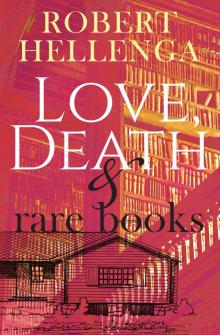 Love, Death & Rare Books
Love, Death & Rare Books The Sixteen Pleasures
The Sixteen Pleasures The Italian Lover
The Italian Lover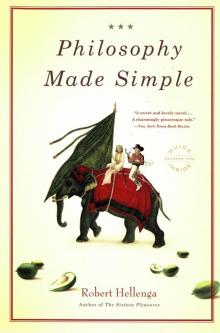 Philosophy Made Simple
Philosophy Made Simple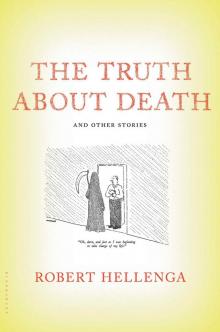 The Truth About Death
The Truth About Death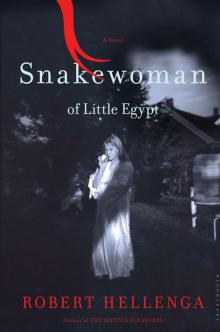 Snakewoman of Little Egypt
Snakewoman of Little Egypt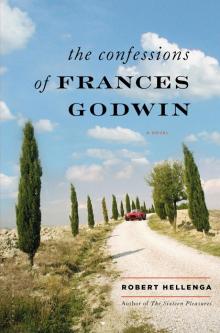 The Confessions of Frances Godwin
The Confessions of Frances Godwin